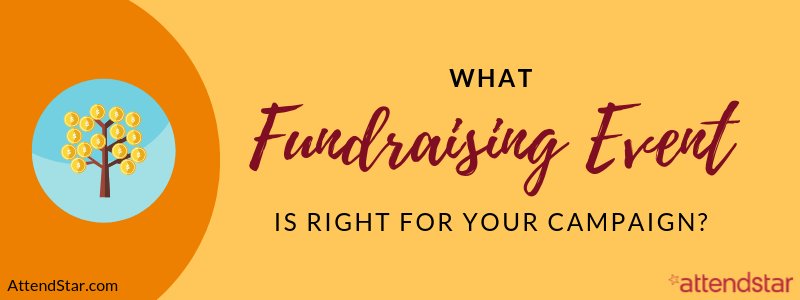Deciding to host a fundraising event for your campaign is a simple step compared to deciding exactly what type of fundraising event to host when the time comes to get started planning.
You’ve probably noticed that the possibilities are endless when it comes to fundraising events. From the low-cost to the high-budget, the easily thrown together to the intensively planned, there are so many options for your upcoming event!
How do you get started when you have the whole world of fundraising events at your fingertips? You have some big decisions to make, but the following steps might help you in your search:
- Gather information about your donors.
- Tailor the perfect fundraising event for your campaign.
- Evaluate your event and use the data for future planning.
Whether you’re a nonprofit, an individual raising money for a good cause, or a business helping to host a charity event, if you follow these three best practices, you’re sure to find the perfect fundraising event for your upcoming campaign!
Follow along for more in-depth information on each step.

1. Gather Information About Your Donors
First and foremost, you must examine the data you’ve gathered on past interactions with donors and consider the target audience you want to reach with your event.
Ideally, this isn’t your first rodeo when it comes to dealing with donor management. You probably have some sort of data on your donors and their engagement with your work.
If you haven’t compiled it yet, just do a little digging— even a basic running record of all your donations in the past year can yield some useful insights.
For nonprofit organizations, the best place to track this data is by storing it in a constituent relationship management system, or CRM, designed specifically for nonprofits. A database platform like Salesforce can also be effective for donor management when it integrates with a comprehensive platform of other fundraising tools.
CRM software will help you evaluate your donor interactions as well as track future donations— something that will be valuable later.
There are a few key pieces of information you should track for each supporter in your database:
- Amount of past donations
- Frequency of past giving
- Preferred donation platform
- Preferred payment method
- Previous event attendance (both who attended and which events had the most engagement)
For example, you might find you have a donor base that enjoys entertainment-based events but only when purchasing event tickets online instead of in-person. Or maybe you’ll notice a specific event, such as a walk-a-thon, had particular success in the past and raised major funds through peer-to-peer fundraising.
Looking at past campaigns with an analytical eye will give you valuable insight for your upcoming fundraiser. With some research, you’ll be sure to craft an event your donors will enjoy and be motivated to contribute to!

2. Tailor the Perfect Fundraising Event for Your Campaign
After evaluating what worked — and what didn’t — in past fundraising events, you can start planning the perfect event for your current campaign.
There are quite a few practical factors that can affect what type of event will be most effective for your organization. Elements such as your event budget, how much time you have to prepare, and what goals you’re looking to achieve with the effort should be considered.
These factors, when paired with the insight you have about your donors and supporters, can help you tailor the perfect event for your campaign.
Now, it’s just time to choose an event and start planning! Here are a few fun events with proven success when it comes to raising funds:
- Sports tournament
- Walk-a-thon
- Trivia night
- Carnival
- Cook-off
- Gala
Follow along for a more detailed look at each event and consider whether it would be a good fit for your upcoming campaign!
Sports Tournament
Whether you opt for an all-day golf tournament or an afternoon dodgeball competition, a sports event has multiple opportunities for fundraising and guarantees a good time for all involved.
Invite your donors to form teams prior to the tournament and charge an entry fee for each group. Encourage teams to both advertise the event on their personal social media pages and draw on peer-to-peer fundraising, soliciting donations for their team through social networks.
Peer-to-peer fundraising is an incredibly effective strategy for these team-based events, as it allows friends and family to donate to the team rather than directly to your organization.
This helps to pull in donations from those that may not be invested in your cause yet but are sure to be invested in supporting their loved ones. By exposing you to these donors, it can greatly expand your audience and base of supporters who you can reach out to again in the future.
On the day of the tournament, structure the event to have two winners — one champion of the physical competition and one champion of the fundraising competition. Sell tickets to what is sure to be an entertaining event and watch spectators and competitors alike have a great day!
Walk-A-Thon
A walk-a-thon is a highly-inclusive way to get donors out for a day of activity. Younger or older, physically fit or less so— most everyone can enjoy a walk-a-thon!
You can structure it to have donors form teams or have each donor participate in a personal fundraising campaign. From there, participants reach into their communities and rally others to pledge a donation corresponding to each unit of distance the participant ends up walking.
These events are particularly well-suited for fundraisers targeting larger, well-connected groups, such as educational institutions or local communities. Once again, peer-to-peer and social media-based fundraising is a surefire method of fundraising with this event.
For a full primer on walk-a-thon fundraisers, check out a comprehensive breakdown here.
Trivia Night
Similar to the sport-based events listed previously, encouraging donors to form teams is a good strategy for trivia competition fundraisers as well. By drawing on teams to fundraise and charging an admission fee for observers, you’re sure to raise generous contributions for your organization.
Further, one of the biggest perks of a trivia night is that you can tailor the trivia to match your audience. For example, using Disney trivia for families or even “This Day in History” trivia for academics is sure to help drive engagement.
As you’ve seen in the past three events, peer-to-peer fundraising is a consistent strategy for these team-focused competitions.
If peer-to-peer fundraising is a strategy you’re interested in, you’ll likely want to invest in a dedicated set of tools for it. Look for a nonprofit toolkit that facilitates the creation of personal and team peer-to-peer fundraising pages.
Carnival
Even though a carnival may seem like an expensive and complicated endeavor to plan, it doesn’t have to be!
Your community carnival can be as simple as setting up stations for apple bobbing, ring toss, and balloon pop games and organizing a baking competition. As long as you include fun games and prizes, you’re pretty much guaranteed happy attendees with this one.
You can make this event as large or small as you please. If you’re interested in reaching for the stars, however, look into leveraging your organization’s relationships to lessen the burden.
Consider asking local businesses to sponsor a booth or make in-kind gift donations of supplies. This will both help lower the cost of the event as well as facilitate good relationships between your organization and local businesses.
Cook-Off
A cook-off is a great way to engage local small businesses in healthy competition.
To host a cook-off, you need to first familiarize yourself with beloved restaurants in your area. Then, invite the local chefs running these restaurants to compete in a community-judged cook-off!
Set up each chef with a tasting station and charge an admission fee for donors to enter. With entry, donors will get to taste the local cuisine and vote on their favorites. The chefs bring awareness to their restaurants, and the event brings awareness to your cause — it’s a win for all!
Bonus! Encourage the chefs to fundraise in their restaurants during the weeks leading up to the competition. Then, at the conclusion at the event, award both the most popular cuisine and the highest fundraiser.
Gala
A gala event is a great opportunity to solicit major gifts from individual donors.
First, you plan a fun evening through which donors can mingle with one another while learning about your cause. Next, you sell admission by the table to groups of donors at a set price — securing a major gift for your organization with each table purchased.
This event pairs well with a silent auction, which you can then use to get local businesses involved. By donating an item to be auctioned off, the business can increase its philanthropic profile in the community.
Each of these events can be organized aligning with your particular campaign, but don’t stop brainstorming here! If you’re looking for more fundraising event ideas, check out Double the Donation’s listing of 145+ free fundraising ideas for inspiration.

3. Evaluate Your Event and Use the Data for Future Planning
After hosting your perfectly tailored fundraising event, you need to evaluate the event to determine just how successful it really was.
Keep your original goal in mind when evaluating the success of your event.
For example, consider the goal of “raise x-amount of money.” Did you solicit enough participants, or sell enough tickets, for the cost of the event to be worthwhile regarding your goal?
Other questions to consider might include:
- Did you raise the donations in a timely manner?
- Did you bring in any new donors?
- What was the most-used method of donating?
- Did the event increase awareness of your organization?
- Was general sentiment of the event positive?
This is where donation processing software, such as Salsa Engage for Salesforce, can really come in handy. This donation processing software can give you insights into how your supporters prefer to give, how much and often they contributed, and which projects they’ve supported.
Now, not only have you hosted a successful fundraising event for your campaign, you’ve also gathered important insights to inform what your next event should be! Just like that, you’re back at the start of the process.
Key Takeaways and Next Steps
Choosing the perfect fundraising event for your campaign can be incredibly difficult, especially considering how many options there are! Not every option is the perfect fit and it’s important to be mindful of what best fits your donors when planning an event.
You should start by paying attention to your donors’ past activities before planning an event that’s both fun and full of fundraising potential. Then, after the event, you should evaluate its success. By following these three easy steps, you’re guaranteed to be successfully fundraising in no time!
About the Author

Gerard Tonti is the Senior Creative Developer at Salsa Labs, the premier fundraising software company for growth-focused nonprofits.
Gerard’s marketing focus on content creation, conversion optimization and modern marketing technology helps him coach nonprofit development teams on digital fundraising best practices.


